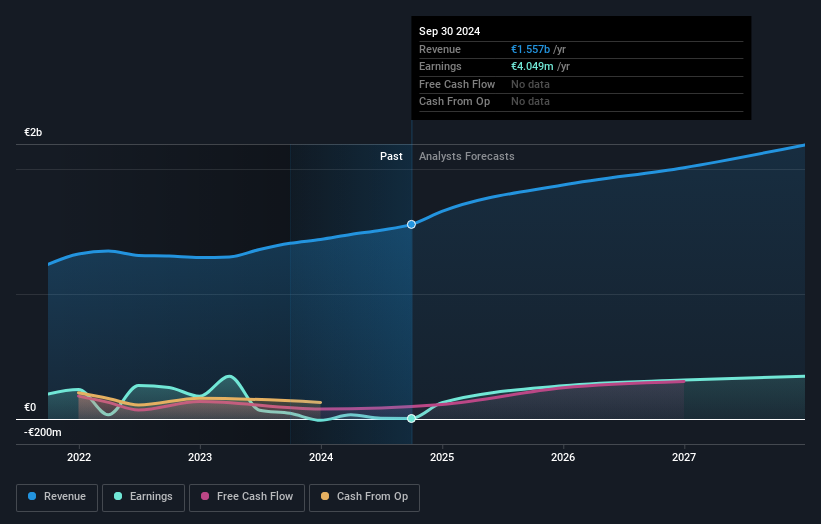
Key Insights
- Super Group (SGHC)'s significant private companies ownership suggests that the key decisions are influenced by shareholders from the larger public
- The top 2 shareholders own 65% of the company
- Institutional ownership in Super Group (SGHC) is 29%
To get a sense of who is truly in control of Super Group (SGHC) Limited (NYSE:SGHC), it is important to understand the ownership structure of the business. With 46% stake, private companies possess the maximum shares in the company. That is, the group stands to benefit the most if the stock rises (or lose the most if there is a downturn).
While institutions, who own 29% shares weren’t spared from last week’s US$206m market cap drop, private companies as a group suffered the maximum losses
In the chart below, we zoom in on the different ownership groups of Super Group (SGHC).
View our latest analysis for Super Group (SGHC)

What Does The Institutional Ownership Tell Us About Super Group (SGHC)?
Institutional investors commonly compare their own returns to the returns of a commonly followed index. So they generally do consider buying larger companies that are included in the relevant benchmark index.
Super Group (SGHC) already has institutions on the share registry. Indeed, they own a respectable stake in the company. This suggests some credibility amongst professional investors. But we can't rely on that fact alone since institutions make bad investments sometimes, just like everyone does. When multiple institutions own a stock, there's always a risk that they are in a 'crowded trade'. When such a trade goes wrong, multiple parties may compete to sell stock fast. This risk is higher in a company without a history of growth. You can see Super Group (SGHC)'s historic earnings and revenue below, but keep in mind there's always more to the story.

Super Group (SGHC) is not owned by hedge funds. Alea Trust is currently the company's largest shareholder with 46% of shares outstanding. Chivers Trust, Endowment Arm is the second largest shareholder owning 20% of common stock, and Neal Menashe holds about 2.6% of the company stock. Neal Menashe, who is the third-largest shareholder, also happens to hold the title of Member of the Board of Directors.
To make our study more interesting, we found that the top 2 shareholders have a majority ownership in the company, meaning that they are powerful enough to influence the decisions of the company.
While studying institutional ownership for a company can add value to your research, it is also a good practice to research analyst recommendations to get a deeper understand of a stock's expected performance. There are plenty of analysts covering the stock, so it might be worth seeing what they are forecasting, too.
Insider Ownership Of Super Group (SGHC)
The definition of an insider can differ slightly between different countries, but members of the board of directors always count. The company management answer to the board and the latter should represent the interests of shareholders. Notably, sometimes top-level managers are on the board themselves.
Insider ownership is positive when it signals leadership are thinking like the true owners of the company. However, high insider ownership can also give immense power to a small group within the company. This can be negative in some circumstances.
We can see that insiders own shares in Super Group (SGHC) Limited. This is a big company, so it is good to see this level of alignment. Insiders own US$124m worth of shares (at current prices). Most would say this shows alignment of interests between shareholders and the board. Still, it might be worth checking if those insiders have been selling.
General Public Ownership
The general public-- including retail investors -- own 21% stake in the company, and hence can't easily be ignored. While this group can't necessarily call the shots, it can certainly have a real influence on how the company is run.
Private Company Ownership
Our data indicates that Private Companies hold 46%, of the company's shares. It might be worth looking deeper into this. If related parties, such as insiders, have an interest in one of these private companies, that should be disclosed in the annual report. Private companies may also have a strategic interest in the company.
Next Steps:
It's always worth thinking about the different groups who own shares in a company. But to understand Super Group (SGHC) better, we need to consider many other factors. For example, we've discovered 2 warning signs for Super Group (SGHC) that you should be aware of before investing here.
Ultimately the future is most important. You can access this free report on analyst forecasts for the company .
NB: Figures in this article are calculated using data from the last twelve months, which refer to the 12-month period ending on the last date of the month the financial statement is dated. This may not be consistent with full year annual report figures.
Have feedback on this article? Concerned about the content? Get in touch with us directly. Alternatively, email editorial-team (at) simplywallst.com.
This article by Simply Wall St is general in nature. We provide commentary based on historical data and analyst forecasts only using an unbiased methodology and our articles are not intended to be financial advice. It does not constitute a recommendation to buy or sell any stock, and does not take account of your objectives, or your financial situation. We aim to bring you long-term focused analysis driven by fundamental data. Note that our analysis may not factor in the latest price-sensitive company announcements or qualitative material. Simply Wall St has no position in any stocks mentioned.